Another internship rejection.
“We’ve decided to move forward with other candidates.”
It stings. Especially when you’ve spent hours filling out forms, tweaking your resume, and hoping this time would be different.
But you know what? No experience isn’t the problem. Your cover letter is.
Because what if….
You could turn that lack of experience into a compelling story of passion and potential?
Show recruiters exactly why you’re worth betting on, even if you’ve never worked a day in their industry?
Had a cover letter so tailored, so confident, that it gets you interviews on autopilot?
Yes, it’s possible.
And that’s exactly what this blog will help you do.
In this blog, we’ll break down how to write a cover letter for an internship with no experience, what recruiters want to see and how to prep your resume to back it up.
We’ll also cover the proven structure of a winning cover letter, plus examples across different industries, templates, writing tips, and mistakes to avoid.
Whether you’re wondering how to write a good cover letter for an internship in general or need specific guidance for technical roles, we’ve got you covered.
Let’s dive in.
Key Takeaways
- No experience? No problem. Academic projects, volunteer work, and part-time jobs carry weight if you frame them to highlight relevant skills and outcomes.
- Personalization beats perfection. A cover letter that references the company’s work or recent news always outperforms a polished but generic one.
- Numbers grab attention instantly. Quantify achievements such as team size, GPA, project results, budgets handled, engagement growth.
- Structure matters more than creativity. Follow the five-part format: header, opening, relevant experience, closing, and signature.
- Use keywords from the job post naturally. If you don’t, ATS filters might screen you out before a human sees it.
- One size fits none. Customize every single cover letter for each internship. Generic applications are instantly recognizable and ignored.
What Recruiters Look for in Student Applications

Recruiters are scanning dozens (if not hundreds) of student applications every day. Their brain is asking one simple question:
“Does this person care about this role, or is this just one of 50 copy-pastes?”
You have to show that you’ve done homework and genuinely want this opportunity.


Never Worry About AI Detecting Your Texts Again. Undetectable AI Can Help You:
- Make your AI assisted writing appear human-like.
- Bypass all major AI detection tools with just one click.
- Use AI safely and confidently in school and work.
Here are the top 5 things recruiters are looking for:
- Personalization That AI Can’t Fake
AI can create a decent-sounding cover letter. That’s your cue to go deeper. Mention the company by name. Talk about a recent campaign, a product, or their mission. Use real details. A sentence like,
I’m excited to apply to [Company Name] after reading about your recent initiative on [X]…”
goes way further than a generic “I’m applying for the internship role.”
- Clear Motivation & Direction
Recruiters want to know why you want this role? And why now?
Generic enthusiasm like “I’m excited about this opportunity and hope to learn more about your company…” won’t cut it. Show how the internship fits into your bigger career goals.
Say:
This role stood out because it blends data analytics with real-world business problems, exactly where I want to grow as I pursue a career in business intelligence.
- Relevant Skills or Experience
Even if you don’t have formal work experience, you do have relevant skills. Use class projects, side hustles, volunteering, or clubs to highlight transferable strengths like:
- Teamwork
- Problem solving
- Communication
- Research & analysis
Share one quick sentence that shows the skill in action:
In a team of five, I led a campaign strategy project that improved engagement by 20%.
- Professional Format & Tone
Use a friendly but professional tone. Show confidence without trying too hard.
- Culture Fit & Enthusiasm
If you’re applying to a company, show that you “get” them. Reference their values or mission in a way that feels natural.
What drew me to [Company] was your focus on ethical design, something I’ve explored in my coursework and care deeply about.
This tells them you’re not just a fit for the job, you’re a fit for the team.
Before You Start Writing
- Read the Internship Description Carefully
To identify what tasks, qualifications, or tools are listed in the job description, you have to adopt a 3-pass reading method:
| Pass | What to Check | What to Do |
| 1. Overall Fit | Does the role excite you? Are tasks aligned with your goals? Can you commit for 10–12 weeks? | Apply only if the work feels meaningful to you. |
| 2. Qualifications | What’s “required” vs. “preferred”? Which skills do you truly have? | Focus on your real strengths. |
| 3. Keywords & Culture | Spot 2–3 repeated terms (e.g., “Excel,” “campaigns”). Look for values (e.g., “collaborative”). | Use exact keywords and reflect their tone in your cover letter. |
You can also use AI to streamline your process. For example, you can go to AI Chatbot, and ask it to:
- Analyze this job description and identify the top 5 most important qualifications
- Extract keywords from this internship posting that I should include in my cover letter.
- Research the Company and Its Values
Generic applications are easy to spot—and ignore. Your job is to prove you’ve done more than skim the website.
Take out at least 30 minutes to research:
- Company website “About Us” section
- Recent news updates and press releases
- LinkedIn company updates and employee posts
- Glassdoor reviews for culture insights
- Annual reports and sustainability initiatives
Look for specific details that genuinely resonate with your background.
For example:
I was impressed by your recent initiative to reduce plastic packaging, which aligns with my research project on sustainable supply chains.
- Identify Relevant Skills, Courses, or Projects
The biggest mistake students make is listing responsibilities instead of demonstrating impact.
Recruiters don’t care that you “participated in a group project.” They want to know that you “led a team of five in a social media campaign that grew engagement by 15%.” You can use STAR method to tackle this part effectively:
- Situation: What challenge or context did you face?
- Task: What needed to be accomplished?
- Action: What specific steps did you take?
- Result: What measurable outcome did you achieve?
Examples:
- Coordinated 4-person marketing team for semester-long campaign simulation
- Led fundraising effort that raised $2,000 for local food bank
Prepare Your Resume First
You should prepare your resume first because they both work like a team. Here’s the breakdown:
- Your resume lists your education, skills, experience, and achievements. It’s the facts. Use AI Resume Builder to generate a customized resume at the speed of a click.
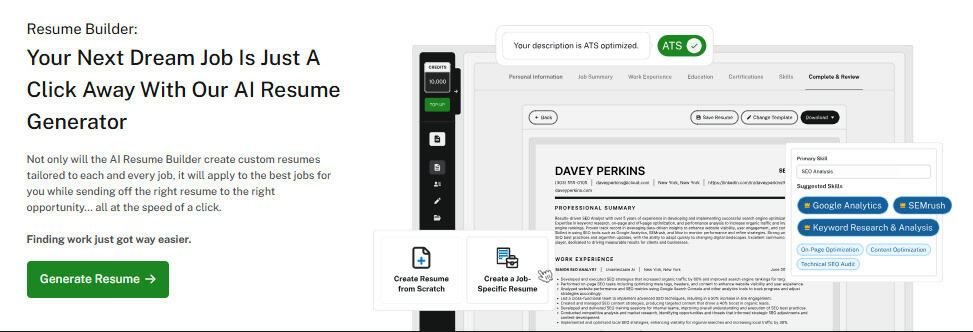
- Your cover letter adds context. It shows why this internship, why now, and how it fits into your bigger career story. Use AI Cover Letter Generator to get a perfect and customized first draft.
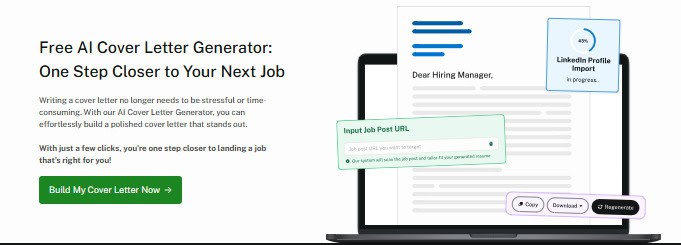
Resumes map out your accomplishments and skills. Once it’s done, it becomes easier to select what to expand on in the cover letter. You’ll avoid repetition and keep your message focused.
Also Read: Best AI Resume Builders For Your Next Job Application
Give Your Internship Documents Professional Titles
Before you hit send, make sure your files and subject lines look professional, too.
Using our Undetectable AI’s AI Title Generator, you can instantly create polished, role-specific titles for your cover letters, resumes, or even email subject lines.
Simply enter your target position or field, and it generates clean, professional title suggestions that make your application stand out.
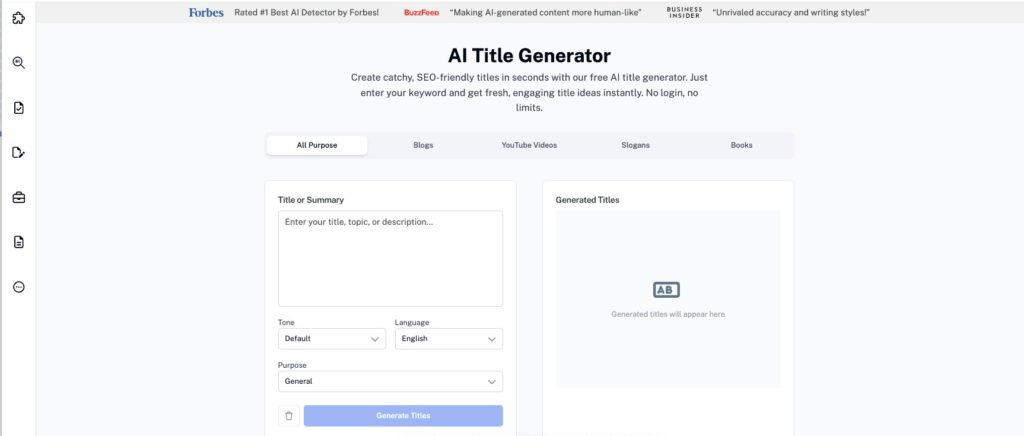
It’s a small detail that can make a big difference in how recruiters perceive your professionalism.
Structure of a Strong Internship Cover Letter
The most effective internship cover letters use a five-part structure.
This framework works whether you’re learning how to write a cover letter for an engineering internship or writing a general cover letter for an internship in any field:
- Header
Include your full name, major or graduation year, contact info, and optionally your LinkedIn URL. Add the employer’s name, title, company, and address underneath.
- Opening Paragraph
State your degree, year of study, and how you found the role. Then hook them with a specific reason you’re excited about this company (hint: research). If someone referred you, mention that here.
- Middle Paragraph(s)
Highlight 2–3 skills or experiences that directly match the job description. Pull from relevant coursework, group projects, clubs, or part-time jobs. Use concrete examples like, “Led a team of four…” instead of “Strong leadership skills.”
- Closing Paragraph
Reinforce why you’re a strong fit. Show enthusiasm without being generic. Close with a clear call to action:
- I’d love the opportunity to discuss how I can contribute to your team.
- Signature
Use a formal sign-off like Sincerely or Best regards. Triple-check for typos, formatting issues, and name accuracy.
Also Read: How to format a cover letter: Easy Guide (with Templates)
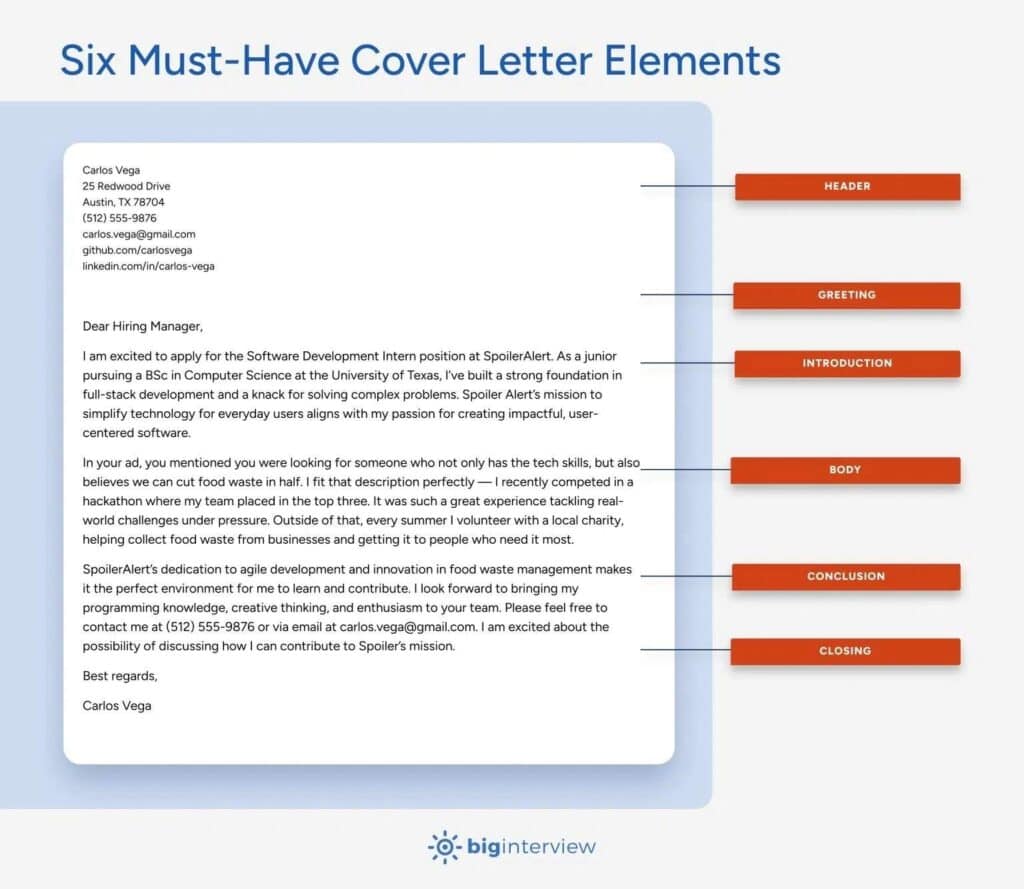
You can generate a cover letter that follows the exact required structure:
- Go to a Cover Letter Generator.
- Input your personal details or import your LinkedIn profile.
- Download the first draft and customize it to suit your preferences.
Here are formatting & word count requirements:
- Length: 250–350 words max
- Font: Clear, professional (e.g., Arial, Calibri, Times New Roman)
- Layout: Clean spacing, consistent formatting, no clutter
What to Include If You Have No Experience
If you’re a student, chances are you don’t have direct work experience yet, and that’s exactly why you’re applying for an internship.
When figuring out how to write a cover letter for an internship with no experience, you can frame what you have in a way that shows readiness, initiative, and potential. Here are three alternatives:
- Lead with Academic Projects
Highlight projects where you applied tools or concepts relevant to the internship. Example:
- Analyzed a dataset of 10,000+ entries using Python for a statistics assignment.
- Use Volunteer or Personal Projects
Community service, club leadership, or even side projects show responsibility, teamwork, and initiative.
Example:
- Led a team of five in a semester-long marketing simulation.
- Raised $2,000 through a fundraising drive for a local nonprofit.
- Emphasize Transferable Skills
Even if you’ve never worked in an office, you’ve likely practiced problem-solving, communication, or leadership. Highlight moments that show fast learning or adaptability. Example:
- Managed 5-person team for semester-long marketing simulation.
- Analyzed dataset of 10,000+ records using Python for statistics course.
If you’ve mentioned any of the three options, and your draft feels very forced, there’s a solution too. You can use AI Humanizer to sound more natural, polished and real.
Tips for Writing an Internship Cover Letter

If you follow these 4 sharp writing tips, your cover letter has a fair chance of getting noticed. These strategies apply whether you’re writing a good cover letter for an internship in business, tech, or any other field:
- Set the Right Voice and Tone
Your cover letter should sound like a confident, enthusiastic student.
To do this, you’ll have to show genuine excitement about the opportunity while using clear, direct language that demonstrates maturity. Read your letter aloud.
If it doesn’t sound like something you’d naturally say in a professional conversation, revise for authenticity.
- Quantify Everything Possible
Numbers immediately grab attention and provide concrete evidence of your capabilities. Include your GPA if it’s 3.5 or higher, but also look for less obvious quantification opportunities throughout your experiences.
Examples:
- Led team of 5 students in semester-long marketing simulation.
- Increased social media engagement by 25% during a 3-month volunteer campaign.
- Managed budget of $2,500 for annual fundraising event.
- Use Power Words That Demonstrate Initiative
Student cover letters often rely on passive language that minimizes their contributions. Replace weak verbs with action words that show leadership and impact.
Power Word Examples:
- Collaborated (instead of “worked with”)
- Analyzed (instead of “looked at”)
- Implemented (instead of “used”)
- Researched (instead of “studied”)
- Developed (instead of “created”)
- Eliminate Weak Opening and Closing Language
Certain phrases immediately signal amateur application writing and waste valuable space in your limited word count.
Avoid These Overused Openings:
- I am writing to apply for…
- I would be perfect for this position because…
- Please consider my application for…
- I am very interested in…
Skip These Generic Closings:
- Thank you for your time and consideration
- I look forward to hearing from you soon
- Please feel free to contact me if you have any questions
Instead, start with specific context about how you learned about the role and end with confident action language about next steps.
Internship Cover Letter Examples
Here are the three internship cover letter examples based on three archetypes. These examples demonstrate how to write a good cover letter for an internship across various industries:
- Oakton College Cover Letter Example – Ideal for students with no experience but strong academic projects.
- Teal Cover Letter Example – Perfect for showing how to write a cover letter for an engineering internship.
- Career Centre Cover Letter Example – Tailored for creative or communications roles.
If you’re unsure whether your cover letter is heading in the right direction, use AI Chat as your personal writing coach.
It will review your draft and offer actionable suggestions for improvement.
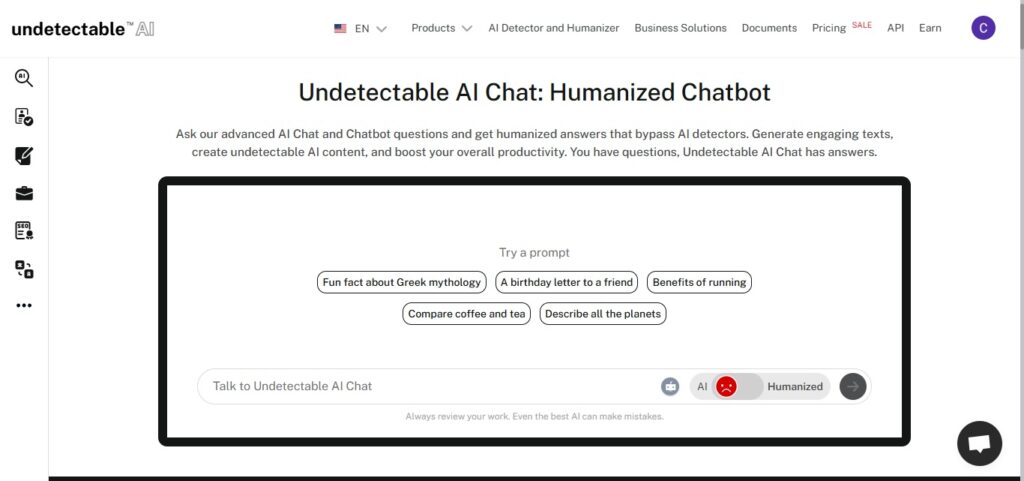
Once you’re happy with the content, run it through the Grammar Checker.
Typos and poor grammar signal carelessness which is something recruiters notice immediately. This tool ensures your grammar, clarity, and formatting are sharp before submission.

Customizing Your Letter for Each Internship
Tailor your letter for every internship you’re applying to. This is crucial whether you’re creating a general cover letter for an internship template or highly specialized applications. Here’s how to do this:
- Using Keywords from the Job Posting
Scan the job posting and identify repeated terms like skills, tools, or traits.
Once they are identified, integrate them naturally into your letter, as this improves your chances with Applicant Tracking Systems (ATS).
This is your first screener which filters by relevance. You can also use synonyms and field-specific language to show fluency without keyword stuffing.
- Aligning Your Goals with Their Offerings
Show how the internship fits into your short-term learning goals and long-term career plan. Employers want interns who see this as more than a box to tick.
Example:
- I’m looking to grow my hands-on experience with digital campaigns, and this internship feels like a strong next step.
Internship Cover Letter Tips and Tricks
To give your application an extra edge, you have to go beyond the basics. Here are five additional strategies that can elevate your cover letter:
- Mention social proof like any professor’s endorsements, academic honors, or awards when relevant.
- If you’ve spoken to someone at the company or attended their information session, briefly reference it. It shows genuine interest and initiative.
- Close your letter by indicating when you’ll follow up (e.g., I’d be happy to follow up next week if helpful). It sets expectations and signals proactiveness.
- If you’re applying to multiple roles, track each version of your cover letter. This avoids mix-ups and ensures each one speaks directly to the role.
- When appropriate, link to a portfolio, blog, or GitHub. Let your work speak where words can’t, and keep it relevant to the role.
Maintain credibility and clarity—leverage our AI Detector and Humanizer below.
FAQs About Internship Cover Letters
Do I Need a Cover Letter for an Internship?
Yes, you should always send a cover letter even if it’s optional. It shows effort and helps you stand out.
Can I Use ChatGPT to Help Me Write It?
Yes, as long as you customize the output. Make sure the final draft shows your real experience and voice.
Should I Mention My GPA or Test Scores?
Only if they’re strong or specifically requested. Focus more on skills, projects, and relevance to the role.
How Formal Should My Tone Be?
Keep it professional and respectful. Be enthusiastic, but skip slang or jokes.
Final Thoughts
So here’s the wrap up:
Your cover letter isn’t about you. It’s about them… the company, the team, the problems they need solved.
Are you writing to impress, or are you writing to connect?
There’s a difference. One feels desperate. The other feels confident.
The companies that will hire you aren’t looking for perfect candidates.
They’re looking for people who care enough to do the work. The research, the customization, the thoughtful connection between their needs and your potential.
Companies can teach skills. They can’t teach genuine interest.
So before you hit send on that next application, ask yourself:
Does this cover letter sound like someone you’d want to work with?
If the answer is yes, you’re on the right track.
Use tools like the Undetectable AI’s AI Chatbot, AI Resume Builder, AI Cover Letter Generator, Grammar Checker, and AI Humanizer to fine-tune your application and sound polished, natural, and truly human.
Try Undetectable AI now and write with clarity, confidence, and connection.
